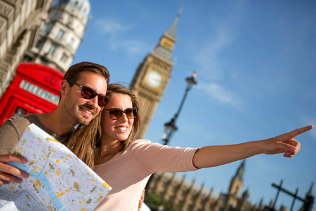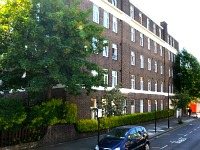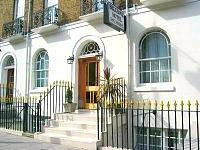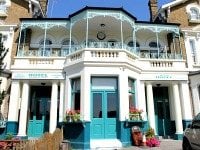10 Tips on How to Be a Savvy London Tourist
You might think Brits are eccentric fops with a love of queuing and manners. In much of the UK, you'd be right on the money. But London is a completely different ball game. Unfortunately you can't guarantee that Londoners are going to treat you with the same manners as the rest of the UK.
Awareness of how much you're irritating someone else is genetically bred into the British psyche, and sad as it is, London can be a bit rough and ready if you've not got your wits about you.
So to help you get along without enraging anyone (as well as not being a target for people like pickpockets), we've thrown together a handy guide for being a savvy London tourist.
Follow a few of the tips below and most people will think you’ve been before and that London fits you like a glove. It's a lot to take on board, but with practice, we're sure that from your first day in London you'll fit right in!
1. Pace
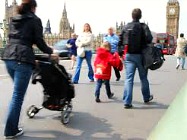
Londoners always appear to be in a rush. Even if they're not going anywhere in particular, they're going there fast. That fact coupled with the eternally delayed transport system means Londoners can be irritable about unnecessary hold-ups. This can mean that even having to slow down slightly to allow someone to tie a shoelace can solicit a Londoner's rage. Londoners aren't a confrontational bunch, so if you do hold one up, the only clue is that they'll huff, puff, mutter something very quietly to themselves and move on.
So do try and keep pace with the flow of pedestrians on any given street. If you were up for a leisurely stroll around London to take in the sights then we commend you, however we must advise keeping such activity as far removed from rush hour as possible. The best times to take in London by foot are weekdays between 11am and 4pm, largely because everyone's at work and it can actually seem pretty quiet. However, either side of that and you'll have great swathes of tutting commuters swarming around being irritable.
2. Positioning

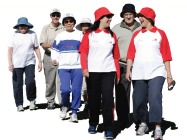
This is related to the previous point and is a matter of great importance. Crowding pavements is one of the biggest faux pas one can make. If there’s more than two of you, we would strongly advise against walking in a line. For example, if there’s four of you, we would advise walking in two pairs of two whilst on pavements. This is due to London having exceptionally narrow roads and therefore even narrower pavements, and if people are walking four abreast, it means people who are in a rush (i.e. every Londoner) can't pass. This will result in the same tutting and huffing as mentioned earlier.
On the underground, the rule on escalators is to stand on the right so that people can pass on the left. This has been the case for at least the last 150 years, so it's reasonable that Londoners have adopted it in every walk of life. When walking along a road, if you wish to slow down, you should do so away from the road, allowing others to overtake nearer the road. If you are walking against traffic (as is also tradition) this should mean you "pull in" to the right, same as on the tube. Note: we drive on the left here. Easily forgotten.
Also, it's worth mentioning here that any unexplained stopping is a major cause for frowning and quiet expletives in London. Particularly if it's somewhere like at the bottom of an escalator, outside a doorway, or anywhere on a street. Essentially, avoid doing anything that might interfere with the direction or speed of anyone else. It soon becomes second nature.
3. Food and drink

Londoners have an almost universal hatred of anyone eating publicly. Whilst you might occasionally notice someone nibbling a sandwich on a tube train, you're also likely to see the majority of the other passengers doing that disapproving mutter the Brits do so well. It is one of the unwritten laws of Britishness that one does not eat improperly, and while table manners have gone the way of the dodo, manners about eating publicly are still observed.
Inexplicably, drinking is different. Drink whatever you like publicly, but do it surreptitiously. Drinking should be a silent exercise, done with typical British moderation. Do bear in mind, however, that for the last few years it has been illegal to drink alcohol on the underground, overground or buses. National rail trains are okay; just don't open your tin of lager on the tube.
4. Restaurant behaviour


Firstly, don't be too loud. Bizarre as it may seem, Londoners are only okay with loud noises if they've chosen to have them. It's not arrogance; in fact it's normally embarrassment. And it may seem obvious, until you go to a restaurant with a Londoner, to think you're being an acceptable level of loud only to have your friend try to indicate with a complicated series of gestures and sideways glances that you might want to keep it down a bit, old boy.
Secondly, it is very rare that Brits complain or send things back. This isn't necessarily a good thing, and it is completely alien to almost every European and anyone from the States or Canada; it is just a bizarre British quirk. The rule of thumb is that if you're going to make a fuss, you take the waiter/manager/whomever aside and have a quiet, private word with them. If you're not happy with something, it is considered good taste to keep the matter as quiet as possible to avoid any unnecessary embarrassment.
Thirdly, the age-old question of tipping. Some consider tipping an unnecessary expenditure whilst others acknowledge they are contributing a significant amount to a service-worker's wage. There is also the global problem of whether the tip actually goes to the waiter/waitress personally. It is not impolite to ask, quite plainly, whether this is the case. A general rule is: only tip if you genuinely had a good customer experience; it is by no means mandatory. And waiters/waitresses are the only people you tip, typically at 10%. We don't have the same culture of tipping bar-staff as other cultures, however there is something you can do which is greatly appreciated...
5. Pub behaviour


Buy your barman a drink. They're not expecting it, and you shouldn't do it every round or they'll get the wrong idea; but just once or twice in a night, simply say "and one for yourself" when buying a round. If you're with a lot of people, buying a lot of drinks and the bar is crowded, this simple gesture can often win you the favour of a barman for the rest of a night, meaning they'll pass over ruder customers to get to you sooner.
Right. Rounds. This ever-so British of traditions has a simple concept. Someone in your group says, "I'll get the first round" and buys everyone's first drink. The favour then gets passed round everyone in the group until you go home. There are a couple of big mistakes people can make: if you're involved in rounds, never shirk your round. If there are more than 3 drinks in a round, offer to assist whoever's getting the round in carrying them. Make sure you know exactly what you're getting before going to the bar.
Other than that, there aren't really any rules about being in pubs. You can generally be as loud as you like. However, despite being a nation of hardened drinkers, the British dislike people being excessively drunk; at least in a public way. If you're one of the few who can drink a large amount and appear sober then fine, but knowing one's limits is a greatly respected trait. And telling someone who's had a few too many to "calm down" is one of the few occasions where it's socially acceptable to address a stranger.
6. Talking to strangers
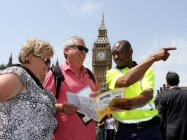

"Mind if I join you?" This sentence is the simplest, best and most acceptable way of starting a conversation with strangers. If they do mind, they will likely tell you; but normally they won't mind (at least in a pub context). After that, introduce yourself, explain that you are visiting and would like their advice on what's best to do. There are exceptions to this rule, however...
Londoners have an inbuilt distrust of everyone who talks to them. Even smiling at a stranger as you walk past (something totally normal elsewhere in the UK, and even 10 miles outside London) is a terrifying ordeal for a Londoner. "Excuse me" is infinitely better than "Hi" or any of its variants, and sounding passive ("I wondered if you could tell me where the train station is") is always better than being direct ("Where is the train station?"). We're not as obsessed with the word "please" as people think, however "thank you" is massively important. Thank everyone for everything with a simple "thanks" or "cheers." Sincerity goes a long way too.
Don't be surprised if you're constantly being apologised to. Most Southerners live in a constant state of thinking they've upset someone, which can be baffling to anyone not used to this affectation. The phrase "I'm terribly sorry, but could you..." does not mean that that person is sorry at all; it's just British politeness. The best policy is to continue as if they didn't say it at all.
7. Expressions
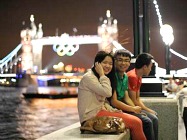

It’s worth adding a few of the expressions that Londoners use. Unless you come from east London, the underground is referred to as the “tube”. One pound is normally one “quid” (and the plural is the same i.e. it’s two “quid” not two “quids”). Five pounds is a “fiver”, ten pounds is a “tenner”, and twenty pounds is a “score”. The “lift” is an elevator, not an escalator. No one will understand you if you try to learn and speak cockney rhyming slang. Most of London is as clueless as the rest of the world; and that’s the point.
If you frequent the same pub near you, it is your “local” and you are a “regular”. If you ask for a “cuppa” you’ll get a cup of black tea, probably with milk. If you want some excellent food, you can go for a “slap-up meal” or some “posh grub”. You might want to call your friend on your “blower” (telephone) so they can come round and watch the “box” (TV).
Soccer is never, ever soccer here; it is only “football” or “footie”. Rugby is sometimes “rugger” but cricket is only ever “cricket”. If you’re male and want to avoid getting drinks thrown over you (or worse) then, contrary to what you may have heard, women are never “birds”. A “wanker” is an extremely offensive expression here, unlike in the States. Your head is your “noggin” or your “bonce”; someone who is constantly taking things but never giving anything back is a “ponce”, and a taxi is a “cab”.
8. Manners

This is perhaps best thought about as "not drawing attention to one's self". The British find all manner of perfectly acceptable things distasteful. Don't talk loudly on your phone; or indeed, at all. If someone is talking to you, give your full attention. Don't text and walk. Don't listen to music too loudly.
But as well as a lot of "don't"s, there are a range of "do"s. Always give up your chair to a pregnant, elderly or disabled person when on public transport. Do offer to buy drinks at the first appropriate opportunity (even if it’s turned down, they'll be flattered). Londoners dislike rudeness but seldom have time for pleasantness, so their policy is generally to ignore everyone. If you feel ignored, be assertive without being rude. "Excuse me" will serve you well.
9. Safety
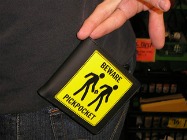

Travel light. It is unlikely male Londoners will take a bag if they’re meeting friends for a drink. If you're a woman carrying a bag, choose one in a thick material with a zip rather than a clasp and keep it to the bare essentials. Avoid carrying your wallet in a back pocket.
Don't carry things that draw attention to you. Cameras are the biggest giveaway, as is taking pictures on a phone. Most hotels have safes to store valuables. London is full of a diverse range of people, so to avoid looking like a tourist, just be who you would be anywhere else and you won't stand out. What really DOES stand out are people who attempt to look like Londoners.
Remember that we drive on the left here, and many Londoners cycle. If there's one group of Londoners who are ready to bite your head off with little-to-no provocation, it's cyclists. They are largely silent, too, so be extremely careful when crossing roads. Many of our traffic systems are unnecessarily complicated, so even though it can be tempting to cross a road when the "do not cross" man is showing, it is certainly not a good idea.
We have famously irritating sinks, with separate taps for hot and cold water. Typically, the cold tap is on the right and the hot on the left, but unlike other countries, this is not uniform, and seems to anger foreigners immensely.
10. Life on the outside
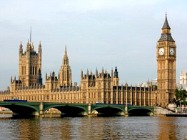
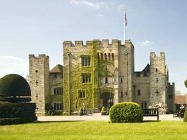
London is like its own micro-country inside the UK and behaviours inside London are very different to those outside. If you do find Londoners a bit brusque, ignorant and bad-tempered, you could be right. Of course, they’re not all like that, but on a bad day, London can feel hostile in its busiest areas.
But we don’t want you to leave the UK with a bad impression of us Brits, so we would recommend you see a little more of the country for a day. If you imagine quaint stone churches, cricket pavilions, thatched cottages and tiny country pubs when you think of England, then you’ve not got far to go. Cornwall, Oxford, Cambridge, Devon, Bristol and East Sussex all offer what you want. However for many of these, you’d need at least a day.
Kent is on London’s south eastern border, and a short train ride from London Victoria or London Bridge can take you to some of the country’s most spellbinding sites, such as Rye, Tonbridge Wells, Canterbury and so on. This is where you can really relax in a way that London doesn’t allow. This is where you can smile and even chat to total strangers walking past in the street. Areas like this are historic, beautiful and full of very approachable people. It’s a lot slower than life in London, and the experience will make you enjoy your time in London even more for the comparison.
TravelStay Giveaway!
You plus one could win:
Event tickets, plus £100 Cash, plus London hotel stay
Every 8 weeks a TravelStay customer stays for free!
You need to enter a valid email address
Your Ultimate Guide to London: Complete with insider tips!


